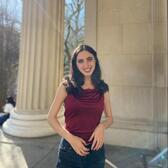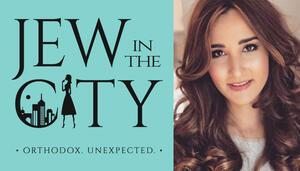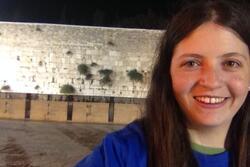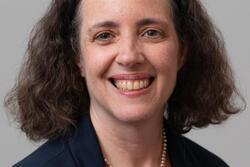Building Bridges: An Interview with Allison Josephs
Allison Josephs’ website Jew in the City is all about celebrating the intersection of Orthodox Judaism and the realities and conundrums of everyday life. Browsing through this beautiful site, one encounters articles that range from the light-hearted (for instance, a recent post was titled “Why Judaism believes in Laurel and Yanny,” in reference to a recent viral audio clip) to the educational (“What is a Kesubah (or Ketubah)? Why is it good for women?”).
The site aims to show that “Orthodox Jews can be funny, approachable, educated, pro-woman, and open-minded—and that Orthodox Judaism links the Jewish people to a deep and beautiful heritage that is just as relevant today as it ever was.” Josephs’ larger mission centers on building bridges between Orthodox Judaism and a mainstream culture that presents limited and largely negative portrayals of Orthodox Jews. We spoke with Josephs about how she came to be Orthodox, her role as a bridge builder, and the intersection between Orthodox Judaism and feminism.
What prompted you to start Jew in the City?
I was raised proudly Jewish, but not Orthodox— in fact, my family was probably bigoted against the Orthodox community, which I think came from a limited understanding of the community. We basically just relied on the media to tell us about Orthodox Jews, and what we heard was that they were crooks, creeps, and criminals.
A traditional, more observant Jewish lifestyle and spirituality became appealing to me when I was a teen. There was a tragedy in my elementary school when I was 8 years old, where a girl I was friendly with was killed by her father. He killed both of his children and himself. After this triple murder, I began to think about my own mortality, and I wondered—where do we all go when this is over? I asked my parents, and they didn’t have an answer for me, and I asked others in my community, and everyone kept giving me the same kind of useless response, like, “Nobody knows, stop thinking about it.” But that wasn’t comforting to me—I had already started thinking about it, I couldn’t stop now. I began to have trouble sleeping at night and suffered from minor panic attacks for the next eight years.
At an after-school Hebrew High my parents sent me to, there was an Orthodox teacher, and I started connecting to what he said about religion and spirituality, and eventually grew to call myself Orthodox. My family was incredibly resistant and warned me that I was joining an oppressive cult. At sixteen, I’d finally had enough of their criticism, and told them to start learning about Orthodox Judaism themselves instead of making snap judgments.
After a year of studying texts and Orthodox practices, my father and the rest of my family ended up becoming Orthodox as well. That experience made me realize I wanted to help fill the holes in people’s Jewish educations—every Jew has the right to know how meaningful these texts and traditions can be in our lives.
As a young adult, I worked at a Jewish outreach organization and encountered many people who seemed completely misinformed about Orthodox Judaism. One woman said, “I want to become more observant, but I don’t want to give up my job.” I was like, “Where in the Torah does it say women can’t work?” Another guy said that he had just been in Israel and was considering becoming Orthodox, but then a bunch of ultra-Orthodox men had thrown rocks at him. I was determined to show people that real Orthodox Judaism is entirely different from our society’s misconceptions.
How has technology and your site, changed the conversation?
Now there finally is a conversation. Before, Orthodox Jews were just spoken to, and the only way to react to a bad headline was to cringe. Now, when there’s a horrible headline about Orthodox Judaism we have the power to say “We denounce that” and encourage dialogue.
We’re able to elevate the voices of people living positive, meaningful lives as Orthodox Jews. We get messages all the time from people who have discovered our site and are educating themselves on the many positive aspects of Orthodox Judaism— they say things like “We’ve made some changes to make our lives and become more observant, and we feel like it’s added so much meaning to our daily lives.”
How have individuals in different denominations of the Jewish community (Orthodox, Reform, secular, etc.) responded to the content on Jew in the City?
I think the world is broken down into two types of people—extremists and moderates. There are extremists on both the right and the left...by the extremist left I’m often called an apologist, by the extremist right, I’m called immodest or a heretic. There will be extremists on both sides who won’t engage in conversation because they pre-judge me, because I’m Orthodox, or a woman, or whatever. Most of the world is moderate, though, and I try to put out information in a non-judgmental way; although this path is meaningful for me, I believe everyone gets to choose their own path in life.
In what ways do you think Orthodox Judaism and feminism intersect?
I feel like “Orthodox” is a word that has a lot of different meanings to a lot of different people, and so does the word “feminist.” For me, the simplest definition of the word “feminism” would be women, and all people really, having the right to make choices about how they live their lives. And in any healthy Orthodox community, everyone has choice on how to live.
I think there is a lot of respect given to women in traditional Jewish texts like “due to the righteous women, the Jewish people were redeemed from Egypt and due to the righteous women the final redemption will come.” The Talmud tells a man that he has to love his wife as much as himself and honor her more. Women were given sexual rights thousands of years ago––something unheard of at the time. But, there are challenging texts and laws as well.
Personally, I look at Judaism as a sort of game of Jenga. If you don’t like a piece of it, you could always just take it out, but at a certain point you run the risk of the whole structure tumbling down. My priority is keeping the “Jenga structure” intact and that means occasionally having to accept the parts of Orthodox Judaism that are not always easy to swallow.
I want to make sure that my choices are preserved, and everyone’s choices are preserved, but, at the end of the day, if there was a trade-off, I would prioritize conserving our heritage and doing all I can to protect that on a bigger scale, even if sometimes there is discomfort for me personally. There is also a continuity that comes with keeping traditions. I was raised with a mentality of picking and choosing and my old friends and community adhered to that as well––but one thing I’ll say is that many of them are not raising their kids Jewish now.
How would you respond to someone who claims that that tzniyut (dressing for modesty) is oppressive towards women?
Obviously, forced modesty is oppression––it must be something a woman chooses. But there is another way that women are oppressed that no one talks about.
We did this fun video a few years ago called “The Skin Gap,” based on idea that my sister started talking about while she was minoring in Women Studies at Barnard and thinking about Jewish modesty. She realized that men actually get a lot more fabric than women do––if you’re walking down the street on a hot summer day, you’ll see a guy wearing a shirt with sleeves to his elbows and shorts that cover his thighs. But if you look at a woman on the same street, she’s wearing a tank top, much shorter shorts, and sometimes her midriff is exposed. Everything is being shown off.
So, my sister wondered––where’s the equality? She looked to traditional Jewish texts and found that tzniyut calls for covering up to one’s elbows and knees, just what men are doing. Tzniyut presents an opportunity for women to be judged by their minds and talents rather than questions like, Did they gain weight? Did they lose weight? Are their boobs bigger? When someone asks me why Orthodox Judaism requires that women cover up so much I respond by asking: why does the secular world want them to take their clothes off?
What is your favorite article that you have published on Jew in the City? Why?
Our video with the Maccabeats! We’re so dependent on our phones and technology in this day and age, and I love how this video shows the meaningful human interaction that happens on Shabbat.
Who are some of your favorite women in Jewish history, and how do they inspire you?
My favorites are Yael (hello, female warrior!) and Esther, who saved our people with courage and self-sacrifice. Bruriah was an extraordinary scholar. All of these women inspire me with their rich legacy of perseverance and dedication.







